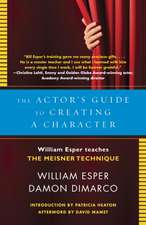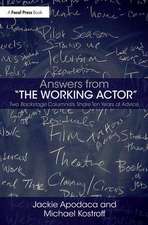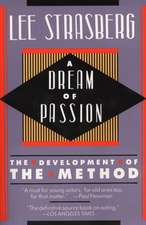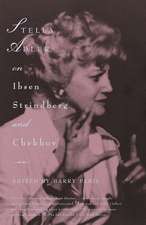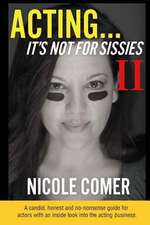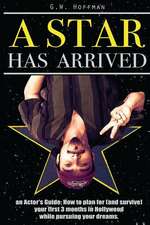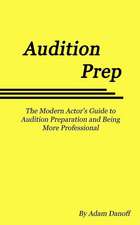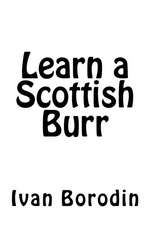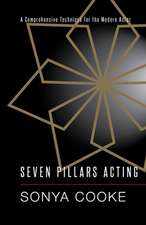The Actor's Art and Craft: William Esper Teaches the Meisner Technique
Autor William Esper, Damon DiMarcoen Limba Engleză Paperback – 6 oct 2008
Esper worked closely with Meisner for seventeen years and has spent decades developing his famous program for actor's training. The result is a rigorous system of exercises that builds a solid foundation of acting skills from the ground up, and that is flexible enough to be applied to any challenge an actor faces, from soap operas to Shakespeare. Co-writer Damon DiMarco, a former student of Esper's, spent over a year observing his mentor teaching first-year acting students. In this book he recreates that experience for us, allowing us to see how the progression of exercises works in practice. The Actor's Art and Craft vividly demonstrates that good training does not constrain actors' instincts—it frees them to create characters with truthful and compelling inner lives.
Preț: 106.32 lei
Nou
Puncte Express: 159
Preț estimativ în valută:
20.35€ • 20.97$ • 17.18£
20.35€ • 20.97$ • 17.18£
Carte disponibilă
Livrare economică 10-24 februarie
Livrare express 24-30 ianuarie pentru 19.34 lei
Preluare comenzi: 021 569.72.76
Specificații
ISBN-13: 9780307279262
ISBN-10: 030727926X
Pagini: 286
Dimensiuni: 134 x 204 x 17 mm
Greutate: 0.23 kg
Ediția:Anchor Books.
Editura: Anchor Books
ISBN-10: 030727926X
Pagini: 286
Dimensiuni: 134 x 204 x 17 mm
Greutate: 0.23 kg
Ediția:Anchor Books.
Editura: Anchor Books
Notă biografică
William Esper is a graduate of Western Reserve University and the Neighborhood Playhouse School of Theatre in New York City. Bill trained as both actor and teacher under Sanford Meisner. Bill and Sandy worked closely together for 17 years, during which time Bill served as Associate Director of the Playhouses's Acting Department (1973-1976). Bill founded the William Esper Studio in 1965 and the Professional Actor Training Program at Rutgers University's Mason Gross School of the Arts in 1977. These two schools are renowned for routinely contributing actors of the highest quality to the International stage and screen.
Damon DiMarco earned his M.A. from the Rutgers University Mason Gross School of the Arts under Bill Esper's tutelage. He has acted professionally on stage, screen, and TV and currently teaches acting and directing at Drew University. Damon's other books include, Tower Stories: an Oral History of 9/11; Out of Bounds (with Roy Simmons); and Heart of War: Soldiers' Voices from the Front Lines of Iraq.
Damon DiMarco earned his M.A. from the Rutgers University Mason Gross School of the Arts under Bill Esper's tutelage. He has acted professionally on stage, screen, and TV and currently teaches acting and directing at Drew University. Damon's other books include, Tower Stories: an Oral History of 9/11; Out of Bounds (with Roy Simmons); and Heart of War: Soldiers' Voices from the Front Lines of Iraq.
Extras
ONE
BEGIN AGAIN--
EMPTY YOUR CUP
"How is it that little children are so intelligent and men so stupid? It must be education that does it."
--Alexander Dumas
Sixteen students wait for Bill to arrive, eight men and eight women. These actors have been carefully selected for their talent, potential, and seriousness of purpose. They come from across the United States and around the world. Some have long resumes stocked with impressive credits; some have acted only in small theaters. Many have studied with various teachers who have espoused different approaches to the craft of acting. Each actor seems to possess talent. In their admission interviews, however, each disclosed unique problems--issues and obstacles that have blocked them from fully realizing their talent.
Everyone smiles in a nervous but genuine way. Introductions are made here and there. We wait.
The room's walls are painted neutral gray. There are no windows and only one door. The class is seated in chairs on low risers stacked against the room's southern end, facing this door across an open space. The risers form the students' gallery. Bill's desk is situated to the side--also looking into the playing area.
The floor is bare, save for two mattresses lying on low bed frames, one against the west wall, one against the east. A shelving unit set to one side contains an array of props: liquor bottles, vases, books, plates, kitchen utensils, strings of Christmas lights, coffee mugs, and a manual typewriter that easily dates back to the 1940s, all available for communal use.
The door to studio C swings open and Bill enters. Everyone quiets instantly. Bill moves to his desk without pausing and grunts a hello, which the class returns enthusiastically. Taking a seat at his desk, he opens a brand-new class roster and reads it for a long moment. Then, apparently satisfied, he looks up and begins.
"Once there was a student who desperately wanted to learn about Zen. So he approached the house of a great Zen master. The master, in a moment of uncharacteristic graciousness, invited the student inside.
"They sat down to tea and the master asked the student, 'Why have you come?' The student opened his mouth and started to babble. A torrent of words poured forth: testaments to his immense curiosity, his passion, his understanding and confusion regarding Zen. On and on the student talked. The master blinked, then set to work making tea. He set out cups, ground the tea leaves, and boiled water while the student kept talking.
"The young man only shut his mouth when the master started to pour the tea. The old man filled the student's cup until the tea reached the brim and overflowed, running all over the table, scalding hot. 'My God!' cried the student. 'What have you done?'
"The old man stopped pouring and said, 'Your mind is like this cup of tea. How can I put anything in it when it's already full? If you wish to learn Zen, you must bring me an empty cup.'"
Bill sits there, watching, as the class takes this in.
"Now tell me," he says. "Why are you here?"
At first no one speaks. Then someone from the back row says: "To study acting."
Bill thinks about this. "Yes, but what is acting exactly? If you wish to study it, it's good to be clear about what it is."
No one speaks. So Bill says, "All right, let me put it this way. Suppose that today you were walking down the streets of Manhattan and you bumped into a Martian. A real, honest-to-God Martian--an alien from another planet. You know he's a Martian because of his short build, green skin, and wiggling antennae."
I glance around. Everyone's eyes are wide.
"Well, naturally you're a little curious, right? So let's say you strike up a conversation with this guy. 'How's life on Mars?' 'Oh, not bad. How's life on Earth?'--that sort of thing. And pretty soon the Martian gets around to asking you, 'So, what is it that you do? By that I mean, what is your profession?' And you say to him--proudly, I hope: 'Well. I'm an actor.'
"The Martian says, 'Really? An actor? What's that? We don't have any actors on Mars.' How would you explain to him what exactly an actor does?"
A thin, wiry young man with a contagious grin and a shock of coarse black hair raises his hand. From the previous introductions I know that his name is Trevor. Bill points to him, and Trevor says, "Acting is living in make-believe."
Bill cocks an eyebrow. "Hmmm. You're onto something. When you say make-believe, I take it you're trying to bring up a point about imagination, am I right?"
Trevor thinks. Nods.
"Good. Because imagination is very important for actors, and we'll be using it a lot. But let's leave that alone and come back to it. Who else has an idea?"
A pretty blond girl with a soft British accent raises her hand. She introduces herself as Amber. Bill points at her. "So what do you think? What is acting?"
"Acting is a form of entertainment," she says.
Bill winces. "Okay," he says. "But so are carnival freak shows, croquet matches, and wrestling. When you get right down to it, tiddlywinks is a form of entertainment. I'd hoped we could aspire to something a little higher than that in here. I don't mean to be sharp, but it's got to be more than entertainment. Much more. Otherwise we'd all be stand-up comedians instead of artists."
Vanessa, a petite African-American woman, says, "You know what I'd tell that Martian? I'd tell him that acting is portraying a character from a story."
Bill thinks. "Okay," he says. "But let me get this straight. This story you're talking about. It takes place onstage, right? So . . . is it real?"
Vanessa thinks for a moment. Then she shakes her head.
"No, it's not," says Bill. "In other words, it's a work of imagination. So here we are again, bringing up this point about imagination." He looks back at Trevor, who nods. "Maybe we've pinned down that acting must have something to do with the imagination."
Several students have begun to take notes. Bill continues: "Here in the studio we have a working definition of acting. This definition comes straight from my own teacher, Sanford Meisner, and--after forty years of teaching--I personally believe it's still valid. Sandy said that 'Acting is the ability to live truthfully under imaginary circumstances.' Have you got that?"
Sixteen heads bob up and down as the class bends to its notebooks.
Bill scratches his chin through his beard and frowns. Then he continues: "All right, then. Let's examine this a bit. Acting is living truthfully under imaginary circumstances. Fine. But before we go any further, let's break that definition down. It seems to me that there are two important factors in that definition that need to be defined. What are they?"
"Living truthfully," says someone in the front row.
"That's right," says Bill. "That's a big one. What else?"
"Imagination. Imaginary," says a female voice from behind me.
"Okay," says Bill. "Let's try to define those things."
Bill looks at the door to the studio for a moment, as if waiting for someone to walk through it. Then he says, "Truth is so important to art, because isn't that how we judge the things we see? Think about it. Have any of you ever come out of a play or a film and said, 'Oh, I really loved it! It was so phony! I didn't believe one moment of it!'"
Everyone laughs. Bill chuckles, too. "Truth is the blood of art. Without truth a piece of art fails to touch the human spirit." Someone in the back row grunts their approval, and Bill continues. "Now let's look at the other side of this definition, the imaginary part. Imagination is pivotal for actors because everything we do, every piece of our craft takes place in the world of imagination.
"When you go to see a play--Hamlet, for instance--you know the man dressed in black isn't really a prince of Denmark. That woman who's marrying her brother-in-law isn't really the queen. As a matter of fact, you're not even in Denmark. You're sitting in upper-mezzanine seats in a Broadway house on Forty-fifth Street and the whole thing is a tissue of lies, a figment of William Shakespeare's imagination. So, if it's all lies, how can we talk about it being truthful?"
Amber looks up. "Because if the actors are skilled, you forget that it's a lie."
Bill nods. "That's right. If the actors are skilled, we'll begin to react to the events onstage as if they were real, as if we were bystanders at some actual event. Do you know why this happens?"
Amber thinks, then shakes her head.
"Because if in fact the actors are skilled, what we're watching isn't pretend. It is an actual event. Do you see how that could be? Hemingway once said, 'All good books are alike in that they are truer than if they had really happened.' Isn't that exactly what we're talking about here?"
More notes. Bill presses forward. "Are you familiar with the late great Harold Clurman? He was an esteemed critic, director, and teacher who was instrumental in founding the Group Theater--maybe the most important theater we've ever had in this country. One of his books was a collection of his theater reviews which he titled Lies Like Truth. I love that title because it captures the essence of theater in three simple words. Lies Like Truth. That's the nature of all good acting: illusion that is real. Imagination made true."
An older woman named Joyce raises her hand. I remember Bill telling me about her. She'd been a moderately successful regional-theater actor for years before taking time off to raise a family. "So are you saying that actors are liars?"
The class laughs. Bill turns to her and smiles. "As a matter of fact, that's exactly what I'm saying."
Everyone stops laughing.
"Yes, actors are wonderful liars. They can make you believe anything, can't they? They'll convince you they just won a million dollars or that their mother died this morning. They'll talk with an accent and make you think they're German when in fact they grew up in Australia. They're wonderful liars--but the difference is this: Their lies are always grounded in truth, and always--always!--their lies serve the purpose of art."
The class is silent. After a sustained moment Bill continues. "You know, I interview students before they come to study with me. I'll often ask, 'Have you ever acted before?' Occasionally someone will say, 'Well, no! I've never acted--not in a play or on TV or in a film. But I act all the time! In life!' What I suppose they really mean is that they lie a lot. To which I say, 'Nonsense! That's not acting.' Because acting doesn't take place under life circumstances; it takes place within the confines of imaginary circumstances."
Bill pauses, thinking about something. "Do you see the difference?" he asks.
The class nods.
"So we've got this wonderful working definition of acting--acting is living truthfully under imaginary circumstances. But there's a problem with it, isn't there? You see the problem, don't you?"
The class stares at Bill with blank expressions.
"Well, it's sort of a general definition, isn't it?"
No one answers.
"Let me show you what I mean," Bill says. He points to one of the young men in the front row. "You," he says. "What's your name?"
The young man has thick black hair and an open expression that is at once both alarmingly direct and vulnerable. He says, "My name is Dom."
"Okay, Dom," says Bill. "This definition we have for acting. What is it again?"
Dom repeats, "Living truthfully under imaginary circumstances."
Bill grins. "Would you do me a favor, then?"
Dom is cautious. "Sure."
"Would you mind coming up here and doing a little 'truthful living' for everyone? Just as an example, of course."
Dom doesn't move.
Bill leans forward. "Is there a problem?"
"I don't . . . I mean . . . I . . ."
"What's up?"
"I wouldn't know where to begin."
"Why not?"
Dom's face becomes a mask of puzzlement. ". . . 'living' . . . ?"
Bill raises his eyebrows. "Don't you know what 'living' means?"
Dom struggles with this for a moment but eventually shakes his head.
"Okay," says Bill. "This is the problem I was talking about. We need to pin this down before we go any further: What does 'living' mean?"
A quick glance around at the class tells me that everyone sees the point Bill's trying to make.
Bill says, "Dom, let me ask you. Were you living today? You were alive, weren't you? This morning, I mean."
Dom thinks, then nods very slowly.
Bill smiles at Dom and continues. "Okay. Good to hear. So, Dom, while you were alive this morning, what did you do?"
"This morning?"
"Before you came here. Yes."
Dom thinks for a moment. "I got up. I made breakfast. I ate it."
Bill seems pleased. "Uh-huh," he says--as if to say, Continue.
Dom glances at the ceiling, thinking. "I answered a few phone calls. Uh, got the paper. I looked for jobs in the classified section. Then I paid my phone bill. Went to the subway station. Bought a new MetroCard and came here."
Bill nods, satisfied. "Okay. So. You did all those things, huh? And maybe tomorrow you'll do some more things. Maybe a lot more. Right?"
Dom shrugs. "Have to. I have to find a job."
The class laughs.
Bill smiles. "I sympathize. But listen. Maybe you've already answered the question about what 'living' is."
Dom stares at him, waiting.
"You say you did all those things today and that you'll do some more things tomorrow. So. Maybe 'living' can be defined by what you do."
Dom thinks about it. Nods. This makes sense to him.
Bill returns his look to the class. "Listen, this is very important. Let's substitute the word 'doing' for 'living.' So now we have: acting is doing--really doing--truthfully under imaginary circumstances.
"This principle--the reality of doing--is the foundation of all good acting and the cornerstone on which all of Sanford Meisner's work is built. The focus of our work will therefore be on learning to really do. This is our first step on the path to the art of acting."
A whipcord-thin man with curly blond hair and a sardonic voice calls out. This is Kenny.
"But how do we know when we're really doing something as opposed to just . . . you know."
Bill cocks his head. "As opposed to not doing it? As opposed to pretending?"
"Yeah."
"Tell me, how many letters are there in your first and last name combined?"
"What?"
"I asked you how many letters are in your name."
BEGIN AGAIN--
EMPTY YOUR CUP
"How is it that little children are so intelligent and men so stupid? It must be education that does it."
--Alexander Dumas
Sixteen students wait for Bill to arrive, eight men and eight women. These actors have been carefully selected for their talent, potential, and seriousness of purpose. They come from across the United States and around the world. Some have long resumes stocked with impressive credits; some have acted only in small theaters. Many have studied with various teachers who have espoused different approaches to the craft of acting. Each actor seems to possess talent. In their admission interviews, however, each disclosed unique problems--issues and obstacles that have blocked them from fully realizing their talent.
Everyone smiles in a nervous but genuine way. Introductions are made here and there. We wait.
The room's walls are painted neutral gray. There are no windows and only one door. The class is seated in chairs on low risers stacked against the room's southern end, facing this door across an open space. The risers form the students' gallery. Bill's desk is situated to the side--also looking into the playing area.
The floor is bare, save for two mattresses lying on low bed frames, one against the west wall, one against the east. A shelving unit set to one side contains an array of props: liquor bottles, vases, books, plates, kitchen utensils, strings of Christmas lights, coffee mugs, and a manual typewriter that easily dates back to the 1940s, all available for communal use.
The door to studio C swings open and Bill enters. Everyone quiets instantly. Bill moves to his desk without pausing and grunts a hello, which the class returns enthusiastically. Taking a seat at his desk, he opens a brand-new class roster and reads it for a long moment. Then, apparently satisfied, he looks up and begins.
"Once there was a student who desperately wanted to learn about Zen. So he approached the house of a great Zen master. The master, in a moment of uncharacteristic graciousness, invited the student inside.
"They sat down to tea and the master asked the student, 'Why have you come?' The student opened his mouth and started to babble. A torrent of words poured forth: testaments to his immense curiosity, his passion, his understanding and confusion regarding Zen. On and on the student talked. The master blinked, then set to work making tea. He set out cups, ground the tea leaves, and boiled water while the student kept talking.
"The young man only shut his mouth when the master started to pour the tea. The old man filled the student's cup until the tea reached the brim and overflowed, running all over the table, scalding hot. 'My God!' cried the student. 'What have you done?'
"The old man stopped pouring and said, 'Your mind is like this cup of tea. How can I put anything in it when it's already full? If you wish to learn Zen, you must bring me an empty cup.'"
Bill sits there, watching, as the class takes this in.
"Now tell me," he says. "Why are you here?"
At first no one speaks. Then someone from the back row says: "To study acting."
Bill thinks about this. "Yes, but what is acting exactly? If you wish to study it, it's good to be clear about what it is."
No one speaks. So Bill says, "All right, let me put it this way. Suppose that today you were walking down the streets of Manhattan and you bumped into a Martian. A real, honest-to-God Martian--an alien from another planet. You know he's a Martian because of his short build, green skin, and wiggling antennae."
I glance around. Everyone's eyes are wide.
"Well, naturally you're a little curious, right? So let's say you strike up a conversation with this guy. 'How's life on Mars?' 'Oh, not bad. How's life on Earth?'--that sort of thing. And pretty soon the Martian gets around to asking you, 'So, what is it that you do? By that I mean, what is your profession?' And you say to him--proudly, I hope: 'Well. I'm an actor.'
"The Martian says, 'Really? An actor? What's that? We don't have any actors on Mars.' How would you explain to him what exactly an actor does?"
A thin, wiry young man with a contagious grin and a shock of coarse black hair raises his hand. From the previous introductions I know that his name is Trevor. Bill points to him, and Trevor says, "Acting is living in make-believe."
Bill cocks an eyebrow. "Hmmm. You're onto something. When you say make-believe, I take it you're trying to bring up a point about imagination, am I right?"
Trevor thinks. Nods.
"Good. Because imagination is very important for actors, and we'll be using it a lot. But let's leave that alone and come back to it. Who else has an idea?"
A pretty blond girl with a soft British accent raises her hand. She introduces herself as Amber. Bill points at her. "So what do you think? What is acting?"
"Acting is a form of entertainment," she says.
Bill winces. "Okay," he says. "But so are carnival freak shows, croquet matches, and wrestling. When you get right down to it, tiddlywinks is a form of entertainment. I'd hoped we could aspire to something a little higher than that in here. I don't mean to be sharp, but it's got to be more than entertainment. Much more. Otherwise we'd all be stand-up comedians instead of artists."
Vanessa, a petite African-American woman, says, "You know what I'd tell that Martian? I'd tell him that acting is portraying a character from a story."
Bill thinks. "Okay," he says. "But let me get this straight. This story you're talking about. It takes place onstage, right? So . . . is it real?"
Vanessa thinks for a moment. Then she shakes her head.
"No, it's not," says Bill. "In other words, it's a work of imagination. So here we are again, bringing up this point about imagination." He looks back at Trevor, who nods. "Maybe we've pinned down that acting must have something to do with the imagination."
Several students have begun to take notes. Bill continues: "Here in the studio we have a working definition of acting. This definition comes straight from my own teacher, Sanford Meisner, and--after forty years of teaching--I personally believe it's still valid. Sandy said that 'Acting is the ability to live truthfully under imaginary circumstances.' Have you got that?"
Sixteen heads bob up and down as the class bends to its notebooks.
Bill scratches his chin through his beard and frowns. Then he continues: "All right, then. Let's examine this a bit. Acting is living truthfully under imaginary circumstances. Fine. But before we go any further, let's break that definition down. It seems to me that there are two important factors in that definition that need to be defined. What are they?"
"Living truthfully," says someone in the front row.
"That's right," says Bill. "That's a big one. What else?"
"Imagination. Imaginary," says a female voice from behind me.
"Okay," says Bill. "Let's try to define those things."
Bill looks at the door to the studio for a moment, as if waiting for someone to walk through it. Then he says, "Truth is so important to art, because isn't that how we judge the things we see? Think about it. Have any of you ever come out of a play or a film and said, 'Oh, I really loved it! It was so phony! I didn't believe one moment of it!'"
Everyone laughs. Bill chuckles, too. "Truth is the blood of art. Without truth a piece of art fails to touch the human spirit." Someone in the back row grunts their approval, and Bill continues. "Now let's look at the other side of this definition, the imaginary part. Imagination is pivotal for actors because everything we do, every piece of our craft takes place in the world of imagination.
"When you go to see a play--Hamlet, for instance--you know the man dressed in black isn't really a prince of Denmark. That woman who's marrying her brother-in-law isn't really the queen. As a matter of fact, you're not even in Denmark. You're sitting in upper-mezzanine seats in a Broadway house on Forty-fifth Street and the whole thing is a tissue of lies, a figment of William Shakespeare's imagination. So, if it's all lies, how can we talk about it being truthful?"
Amber looks up. "Because if the actors are skilled, you forget that it's a lie."
Bill nods. "That's right. If the actors are skilled, we'll begin to react to the events onstage as if they were real, as if we were bystanders at some actual event. Do you know why this happens?"
Amber thinks, then shakes her head.
"Because if in fact the actors are skilled, what we're watching isn't pretend. It is an actual event. Do you see how that could be? Hemingway once said, 'All good books are alike in that they are truer than if they had really happened.' Isn't that exactly what we're talking about here?"
More notes. Bill presses forward. "Are you familiar with the late great Harold Clurman? He was an esteemed critic, director, and teacher who was instrumental in founding the Group Theater--maybe the most important theater we've ever had in this country. One of his books was a collection of his theater reviews which he titled Lies Like Truth. I love that title because it captures the essence of theater in three simple words. Lies Like Truth. That's the nature of all good acting: illusion that is real. Imagination made true."
An older woman named Joyce raises her hand. I remember Bill telling me about her. She'd been a moderately successful regional-theater actor for years before taking time off to raise a family. "So are you saying that actors are liars?"
The class laughs. Bill turns to her and smiles. "As a matter of fact, that's exactly what I'm saying."
Everyone stops laughing.
"Yes, actors are wonderful liars. They can make you believe anything, can't they? They'll convince you they just won a million dollars or that their mother died this morning. They'll talk with an accent and make you think they're German when in fact they grew up in Australia. They're wonderful liars--but the difference is this: Their lies are always grounded in truth, and always--always!--their lies serve the purpose of art."
The class is silent. After a sustained moment Bill continues. "You know, I interview students before they come to study with me. I'll often ask, 'Have you ever acted before?' Occasionally someone will say, 'Well, no! I've never acted--not in a play or on TV or in a film. But I act all the time! In life!' What I suppose they really mean is that they lie a lot. To which I say, 'Nonsense! That's not acting.' Because acting doesn't take place under life circumstances; it takes place within the confines of imaginary circumstances."
Bill pauses, thinking about something. "Do you see the difference?" he asks.
The class nods.
"So we've got this wonderful working definition of acting--acting is living truthfully under imaginary circumstances. But there's a problem with it, isn't there? You see the problem, don't you?"
The class stares at Bill with blank expressions.
"Well, it's sort of a general definition, isn't it?"
No one answers.
"Let me show you what I mean," Bill says. He points to one of the young men in the front row. "You," he says. "What's your name?"
The young man has thick black hair and an open expression that is at once both alarmingly direct and vulnerable. He says, "My name is Dom."
"Okay, Dom," says Bill. "This definition we have for acting. What is it again?"
Dom repeats, "Living truthfully under imaginary circumstances."
Bill grins. "Would you do me a favor, then?"
Dom is cautious. "Sure."
"Would you mind coming up here and doing a little 'truthful living' for everyone? Just as an example, of course."
Dom doesn't move.
Bill leans forward. "Is there a problem?"
"I don't . . . I mean . . . I . . ."
"What's up?"
"I wouldn't know where to begin."
"Why not?"
Dom's face becomes a mask of puzzlement. ". . . 'living' . . . ?"
Bill raises his eyebrows. "Don't you know what 'living' means?"
Dom struggles with this for a moment but eventually shakes his head.
"Okay," says Bill. "This is the problem I was talking about. We need to pin this down before we go any further: What does 'living' mean?"
A quick glance around at the class tells me that everyone sees the point Bill's trying to make.
Bill says, "Dom, let me ask you. Were you living today? You were alive, weren't you? This morning, I mean."
Dom thinks, then nods very slowly.
Bill smiles at Dom and continues. "Okay. Good to hear. So, Dom, while you were alive this morning, what did you do?"
"This morning?"
"Before you came here. Yes."
Dom thinks for a moment. "I got up. I made breakfast. I ate it."
Bill seems pleased. "Uh-huh," he says--as if to say, Continue.
Dom glances at the ceiling, thinking. "I answered a few phone calls. Uh, got the paper. I looked for jobs in the classified section. Then I paid my phone bill. Went to the subway station. Bought a new MetroCard and came here."
Bill nods, satisfied. "Okay. So. You did all those things, huh? And maybe tomorrow you'll do some more things. Maybe a lot more. Right?"
Dom shrugs. "Have to. I have to find a job."
The class laughs.
Bill smiles. "I sympathize. But listen. Maybe you've already answered the question about what 'living' is."
Dom stares at him, waiting.
"You say you did all those things today and that you'll do some more things tomorrow. So. Maybe 'living' can be defined by what you do."
Dom thinks about it. Nods. This makes sense to him.
Bill returns his look to the class. "Listen, this is very important. Let's substitute the word 'doing' for 'living.' So now we have: acting is doing--really doing--truthfully under imaginary circumstances.
"This principle--the reality of doing--is the foundation of all good acting and the cornerstone on which all of Sanford Meisner's work is built. The focus of our work will therefore be on learning to really do. This is our first step on the path to the art of acting."
A whipcord-thin man with curly blond hair and a sardonic voice calls out. This is Kenny.
"But how do we know when we're really doing something as opposed to just . . . you know."
Bill cocks his head. "As opposed to not doing it? As opposed to pretending?"
"Yeah."
"Tell me, how many letters are there in your first and last name combined?"
"What?"
"I asked you how many letters are in your name."
Cuprins
Foreward by David Mamet
Prologue
Bill’s Class
ONE — Begin Again — Empty Your Cup
TWO — The First Exercise — Did You Hear What He Said?
THREE — Repition Continues — Did You Really Hear What He Really Said?
FOUR — Developing Concentration
FIVE — How to Justify Absolutely Anything
SIX — Don’t Gird Yourself to Act; Open Yourself to Receive
SEVEN — Objectives and Expectations: Be Careful What You Want
EIGHT — Action Problems: Awaken Your Inner Criminal
NINE — Scene Work: Private Conversations — Approach the Text and Pick Up Your Impulses
TEN — Farewell to Repition: Don’t Do Anything Unless Something Happens to Make You Do It
ELEVEN — Daydreams, Fantasies, and Your Inner Life: Emotional Preparation
TWELVE — Relationships: I Know He’s Your Brother, but Who Is He Really?
THIRTEEN — The Domestic Exercise: How Are Things At Home?
FOURTEEN — The Second Round of Scene Work: Go Deeper into the Text
FIFTEEN — Final Questions: It’s a Wrap. Now Where Do We Go from Here?
Acknowledgments
Prologue
Bill’s Class
ONE — Begin Again — Empty Your Cup
TWO — The First Exercise — Did You Hear What He Said?
THREE — Repition Continues — Did You Really Hear What He Really Said?
FOUR — Developing Concentration
FIVE — How to Justify Absolutely Anything
SIX — Don’t Gird Yourself to Act; Open Yourself to Receive
SEVEN — Objectives and Expectations: Be Careful What You Want
EIGHT — Action Problems: Awaken Your Inner Criminal
NINE — Scene Work: Private Conversations — Approach the Text and Pick Up Your Impulses
TEN — Farewell to Repition: Don’t Do Anything Unless Something Happens to Make You Do It
ELEVEN — Daydreams, Fantasies, and Your Inner Life: Emotional Preparation
TWELVE — Relationships: I Know He’s Your Brother, but Who Is He Really?
THIRTEEN — The Domestic Exercise: How Are Things At Home?
FOURTEEN — The Second Round of Scene Work: Go Deeper into the Text
FIFTEEN — Final Questions: It’s a Wrap. Now Where Do We Go from Here?
Acknowledgments
Descriere
A master teacher gives actors everywhere the benefit of his vast experience, helping them to build up a solid foundation of skills they can use to create characters with truthful and compelling inner lives.

